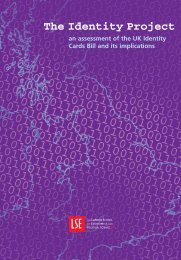Money Laundering: Review of the Reporting ... - Dematerialised ID
Money Laundering: Review of the Reporting ... - Dematerialised ID
Money Laundering: Review of the Reporting ... - Dematerialised ID
Create successful ePaper yourself
Turn your PDF publications into a flip-book with our unique Google optimized e-Paper software.
kpmg<br />
<strong>Review</strong> <strong>of</strong> <strong>the</strong> regime for handling Suspicious Activity Reports<br />
Report <strong>of</strong> recommendations<br />
KPMG LLP<br />
4.4.4 This feedback relies largely on input and involvement from LEAs who have <strong>the</strong> direct<br />
experience <strong>of</strong> investigating money laundering <strong>of</strong>fences and using SARs in operational<br />
activities. It also depends on ECB, which sees <strong>the</strong> full panoply <strong>of</strong> SARs and should<br />
<strong>the</strong>refore be able to identify common <strong>the</strong>mes and “hot topics” across specific industries<br />
and <strong>the</strong> wider market as a whole. LEAs have individual specific requirements relating to<br />
<strong>the</strong>ir particular role and concerns, which need to be passed to ECB for onward<br />
dissemination to <strong>the</strong> disclosing entities. These, if met, would assist <strong>the</strong>m in more<br />
successfully using information on SARs to conduct investigations.<br />
4.5 Value added by ECB processes<br />
“ECB provides information only, not intelligence”<br />
“ECB focuses on process ra<strong>the</strong>r than product”<br />
Source: Interviewees and questionnaire respondents as part <strong>of</strong> KPMG’s review<br />
Inadequate management resource and skills to manage <strong>the</strong> work<br />
4.5.1 The existing management structure <strong>of</strong> ECB is stretched given <strong>the</strong> extent and nature <strong>of</strong> <strong>the</strong><br />
different roles which ECB is required to undertake. ECB has a management team <strong>of</strong><br />
seven people in total dealing with all aspects <strong>of</strong> ECB’s work, including <strong>the</strong> processing <strong>of</strong><br />
SARs, international liaison, and <strong>the</strong> Terrorist Finance Team (“TFT”), and a total staff in<br />
post at February 2003 <strong>of</strong> 98. The Head <strong>of</strong> Branch is required to manage ECB as a whole<br />
across both <strong>the</strong> intelligence development section, <strong>the</strong> TFT, <strong>the</strong> analytical team and <strong>the</strong><br />
intelligence processing teams. Alongside that role he and his Deputy also have to provide<br />
<strong>the</strong> external face <strong>of</strong> ECB to Government, LEAs, internationally, and to <strong>the</strong> financial<br />
services markets. As such <strong>the</strong>ir time and effort is unduly widely spread and <strong>the</strong>y are<br />
unable to provide <strong>the</strong> focus that is necessary on ei<strong>the</strong>r <strong>the</strong> SAR processes or <strong>the</strong>ir o<strong>the</strong>r<br />
responsibilities. The ongoing pressure <strong>of</strong> day to day process concerns prevent those in<br />
management positions throughout ECB from focussing on wider strategic issues.<br />
4.5.2 This in turn places a significant burden on <strong>the</strong>ir direct reports, and in particular on <strong>the</strong><br />
Intelligence Process Manager, who is <strong>the</strong>n responsible for <strong>the</strong> teams processing SARs and<br />
<strong>the</strong> Duty Desk.<br />
Current initial prioritisation procedures<br />
4.5.3 Staff on <strong>the</strong> Duty Desk currently review all SARs as <strong>the</strong>y arrive and decide prior to <strong>the</strong><br />
SARs being input onto <strong>the</strong> system on both <strong>the</strong> initial allocation <strong>of</strong> individual SARs to <strong>the</strong><br />
broad categories <strong>of</strong> ei<strong>the</strong>r “police”, “HMC&E” and/or o<strong>the</strong>r ECB teams (e.g. TFT) and on<br />
<strong>the</strong> prioritisation <strong>of</strong> individual disclosures. These decisions dictate <strong>the</strong> order in which <strong>the</strong><br />
individual intelligence packages are developed within ECB. These decisions are based on<br />
<strong>the</strong> experience <strong>of</strong> <strong>the</strong> relevant individuals but take no account <strong>of</strong> <strong>the</strong> information currently<br />
held within Elmer, o<strong>the</strong>r NCIS or o<strong>the</strong>r LEA databases because <strong>the</strong>y are made prior to<br />
any searches being undertaken. In particular, <strong>the</strong>se initial decisions will not take account<br />
<strong>of</strong> any Alert flags put on <strong>the</strong> system, which are only identified once <strong>the</strong> full searches have<br />
been conducted.<br />
4.5.4 The initial allocation decisions are confirmed and validated on review <strong>of</strong> <strong>the</strong> full search<br />
results, when <strong>the</strong> specific allocation to an individual police force is undertaken. 12 (9%)<br />
jo/fh/519 38









